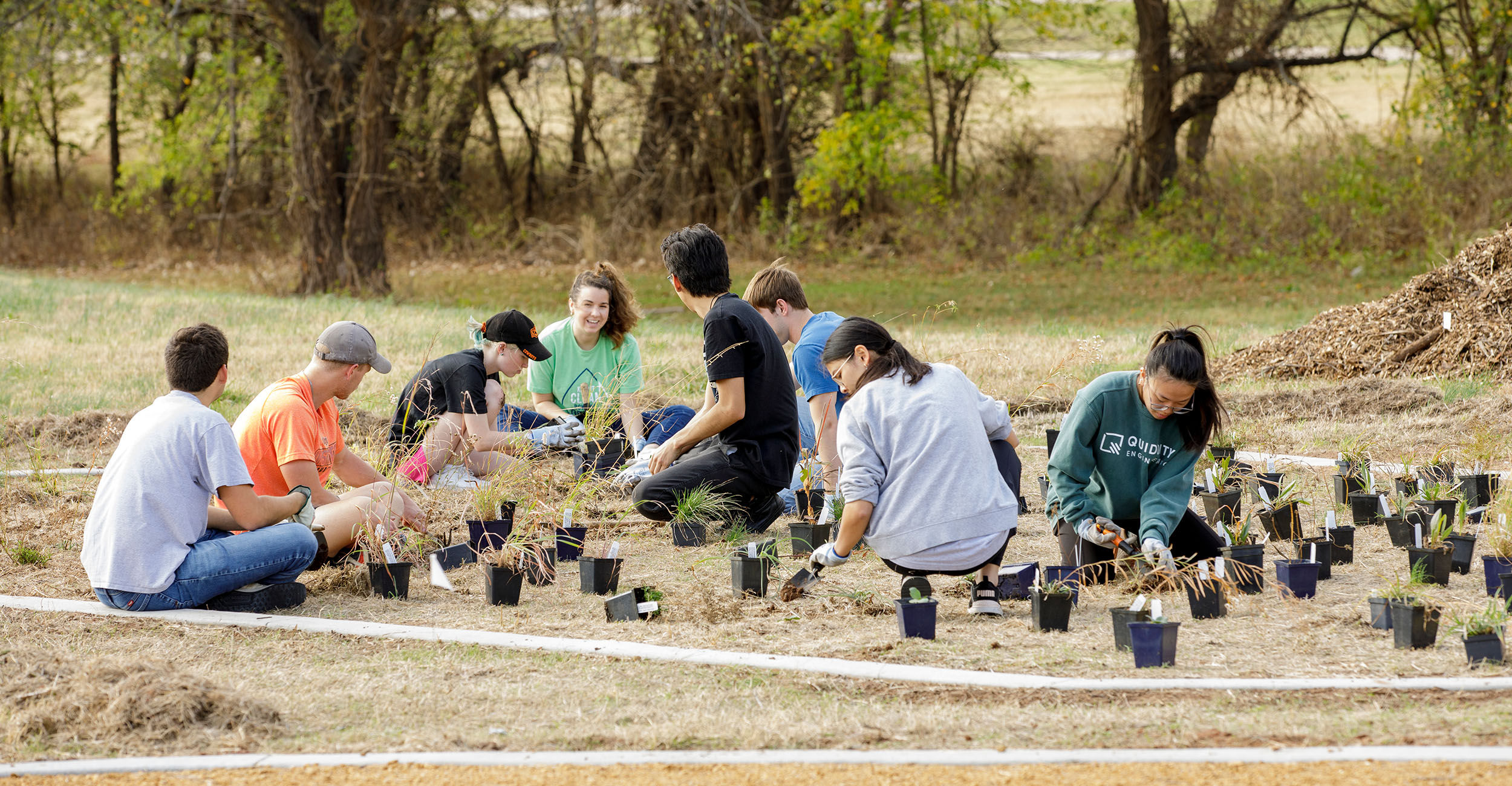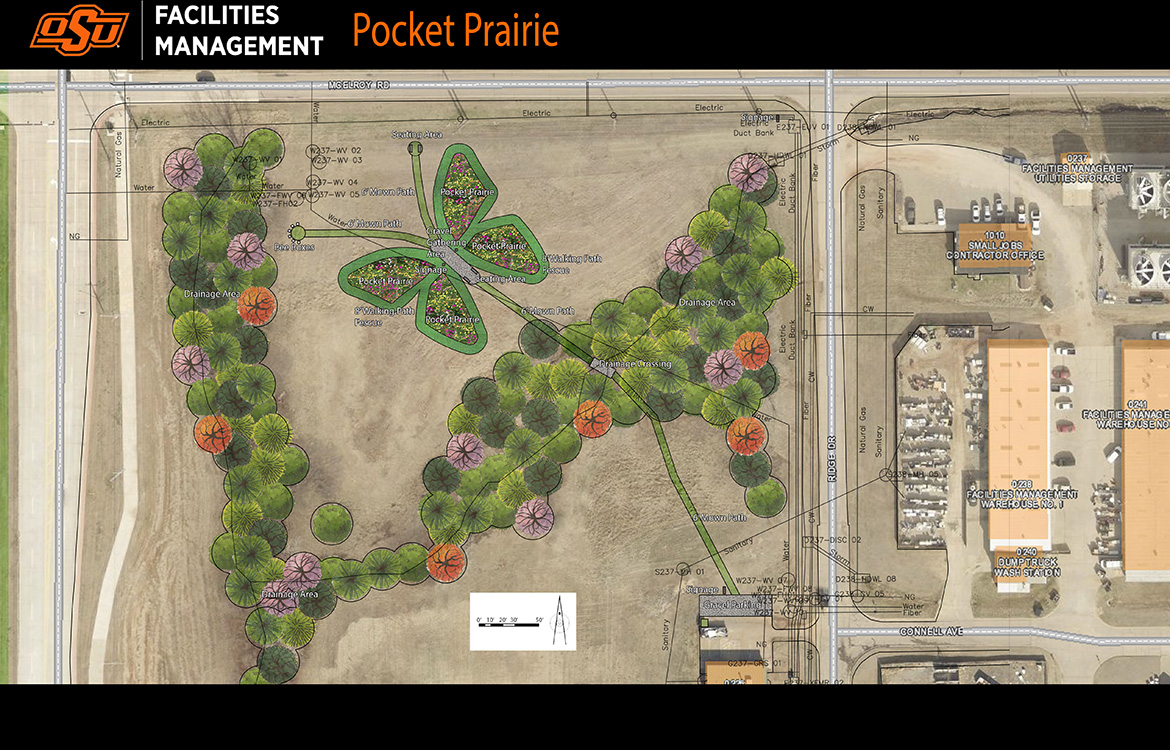
OSU unveils butterfly pocket prairie in Stillwater
Wednesday, January 18, 2023
Media Contact: Shannon Rigsby | Public Information Officer | 405-744-9081 | shannon.rigsby@okstate.edu
Along the flight path to Stillwater Regional Airport, inbound passengers will catch the shape of a gigantic butterfly at the corner of McElroy Road and Western Road.
With a 122-foot wingspan and 4,000 square feet of native grasses in all four wing segments, Oklahoma State University’s new butterfly pocket prairie is a nearly perfect partnership of environmentally minded students working with the university to make a positive change.
John Lee, director of Landscape Services, said the project is not only beautiful but it also improves the environment and lessens the costs to maintain the land. Instead of mowing the entire field, two 6-foot wide strips will be mowed from the parking area around the butterfly for visitors.
We’re already doing something to maintain the area,” Lee said. “We thought, ‘Why not maintain something that creates more benefit and provides a habitat for pollinators?’ The students have been wonderful in helping this garden take shape, and I am tremendously grateful to our senior administration for supporting such a unique project. ”
Nick Oullette, manager of Landscape Services, said native plants are being reintroduced into the pocket prairie.
“In all, there are 34 different plant species,” he said. “We’ve selected plants so that there is something blooming throughout the entire season.”
Carly Noone, a third-year civil engineering student, serves as the networking chair for Engineers Without Borders. When she heard the OSU Student Government Association was offering a $5,000 Green Student Initiative grant, she applied.
“Personally I’m very passionate about sustainability and our impact on the environment,” Noone said. “Gabby Barber, who works with the OSU Office of Sustainability, reached out to me and said I should apply for the grant. So I reached out to the landscaping department and the other officers with EWB, and they were totally cool with wanting to help with the project.”
Barber, a senior majoring in plant biology, has worked with the Sustainability Office since fall 2020. She applied for OSU to be a monarch butterfly waystation and designed an insect hotel which will be going in behind the Edmon Low Library.

Steve Dobbs, former director of Landscape Services and current horticulture consultant, always thought this was the perfect location for a pocket prairie. He planted the proverbial seed and then Lee took it one step further, with the idea of a butterfly design. Oullette moved the process along one step further still, laying out the butterfly’s design with walking trails around the edges, benches and a spot for bee boxes at the end of the longest antennae.
Before winter break, the landscape staff was joined by students for a field day to plant grasses. The students who participated came from nine different majors, from geography and civil engineering to statistics and psychology.
The 6-inch concrete edge restraints that outline the wings were already in place. The butterfly’s hind (lower) wings were hand-planted with native grasses. The forewings were seeded with a grass and forbs mix. The exterior 6-foot band surrounding the wings was seeded with tall fescue and a ryegrass blend that will be a mowed pathway for visitors. The abdomen of the butterfly is filled with decomposed granite chips. There is also a garden map and benches for visitors to enjoy the view.
“The plantings will attract all sorts of pollinators,” Lee said. “If we get 200 species of insects out here pollinating, that’s fantastic.”
For Barber, who got the ball rolling by connecting the right person to the right grant opportunity, she was delighted to play even a small part in the pocket prairie.
“The biggest piece for me is advocacy,” she said. “I grew up camping, hiking and being in nature. It’s very personal for me. I would go so far to call it spiritual. These ecosystems are disappearing. There’s no other way to put it. Not everyone is in a position like me; this will be my career.
“It means something to me to be an advocate. All of these things are such an easy and impactful way for other students to care about some component of environmentalism.”
